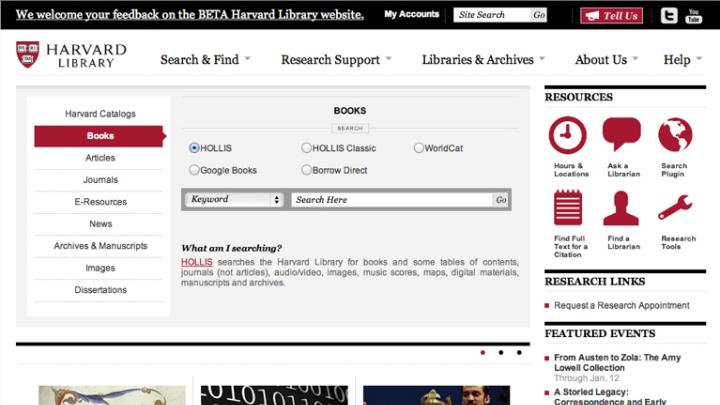A few days after the quiet debut of a new online portal for the Harvard Library, still in a beta version, executive director Helen Shenton and senior associate provost for the Harvard Library Mary Lee Kennedy met with Harvard Magazine to discuss the milestones achieved in the development of the new, consolidated organization of the Harvard Library.
The August 1 launch of a shared-services organization (comprising access services, information and technical services, preservation and conservation and digital imaging services) within the Harvard Library involved the redeployment of 430 library staff members, as well as six layoffs and 65 early retirements. Because it was coordinated with all the library organizations within the individual schools, which remain fiscally accountable to their respective deans, this was, says Shenton, “a hugely complex undertaking, that involved, for example, the human resources and financial offices in every single school.” Each person learned about his or her new role individually; thereafter, each staffer had six orientation meetings in the course of several weeks during which they met their new colleagues.
Although most employees remain embedded in their respective schools, the new cross-University organization allows more flexibility in coverage. Shenton cites conservation as an example: “There have been five or six different conservation groups that can now act as a cohort. We can design training and development together. We can have people work in different studios in order to learn different techniques.” This is not only “more flexible but also more interesting for staff,” she says.
The unification of shared internal services, many of them not typically seen by library patrons, is now mirrored publicly in the library’s new consolidated online portal. The previous online access point for visitors to the library included three tools like HOLLIS, the searchable digital library catalog. The new portal allows visitors to search 34 repositories—including databases such as DASH, JSTOR, WorldCat, and Borrow Direct—from a single window. The portal includes a directory of library staff members and allows users to request a research appointment with a librarian in any library across the University. The amenities offered in each library are represented on the site by icons with pop-up text explanations. Users can search by amenity (which libraries have food services, iPads for loan, color printers, bioinformatics accounts, even a therapy dog), or by the hours a library is open. Events are now listed in a single location, as part of a calendar that covers the entire library system.
The new portal is the outgrowth of one of the library’s main priorities in information technology: the improvement of search and discovery on behalf of patrons. “We know that it is very challenging in this day and age to find information,” says Kennedy. “The portal is a first step,” she says, promising that “the way we provide access will become even more powerful” in the future.








